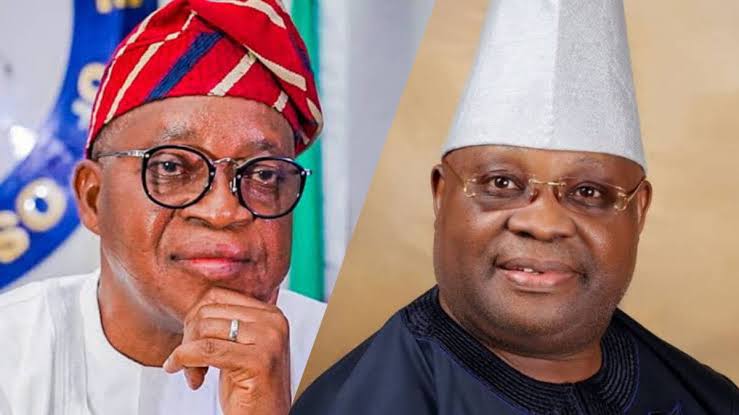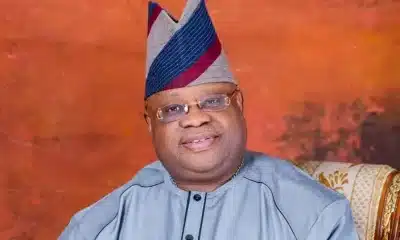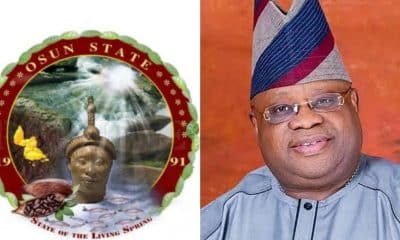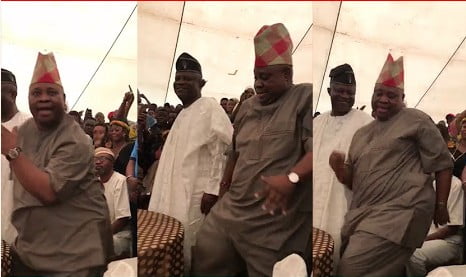Nigeria News
Osun: Appeal Court To Decide Adeleke’s Fate On Friday

The fate of the Osun State Governor, Ademola Adeleke would be decided by the Court of Appeal sitting in Abuja on Friday.
Governor Adeleke and the Peoples Democratic Party (PDP) had filed an appeal before the appellate court asking it to set aside the verdict of the Osun State Governorship Election Petition Tribunal, which sacked him from office.
Recall that Justice Tertsea Kume-led three-member panel tribunal, on January 27, in a split decision of two-to-one, voided the declaration of Adeleke as the winner of the 16th July governorship election in the state.
The petition which was filed by a former governor of the state, Gboyega Oyetola of the All Progressives Congress (APC) was upheld by the majority.
According to the majority judgment, Adeleke did not score the majority of lawful votes, adding that the conduct of the election was not in substantial compliance with provisions of the Electoral Act, 2022.
The tribunal ruled that Oyetola and APC, successfully established that there was overvoting in 744 polling units in the state.
After deducting the said invalid votes, the tribunal declared Oyetola as the winner of the governorship contest and directed the Independent National Electoral Commission (INEC) to withdraw the Certificate of Return issued to Adeleke.
However, in his dissenting judgement, the third member of the panel, Justice P. Agbuli, affirmed Adeleke as the valid winner of the election, even as he struck out the petition that was lodged by Oyetola and the APC.
Meanwhile, dissatisfied with the majority decision that sacked him from office, governor Adeleke took the case before the Court of Appeal.
In his 31 grounds of appeal, Adeleke, maintained that the decision was a nullity, pointing out that the second member of the panel, Justice Rabi Bashir, failed to render her opinion on the petition, either orally or in writing, but merely appended her signature on the judgement.
“The second member of the lower Tribunal could not have validly signed the decision of the chairman of the lower Tribunal without an opinion.”
Adeleke, through his team of lawyers led by Onyechi Ikpeazu, SAN, further contended that the tribunal decided the matter without considering the totality of evidence that was adduced before it.
The embattled Osun state governor accused the panel of exhibiting its bias when it left the substance of the case and made reference to his dancing skill.
He noted that the tribunal, in the majority judgement, held that he could not “go lo lo lo lo” and “buga won” as the duly elected governor of Osun state.
Adeleke argued, “The tribunal, in its judgment, erred in law and displayed bias against the Appellant when it referred to the Appellant’s dance at his inauguration as governor of Osun state which was never an issue before the lower tribunal.
“By referring to the Appellant’s personal eccentricity for dancing, the lower tribunal derided and mocked him in a manner suggesting that it was biased against him.
“The appearance of bias manifests in the reference to the Appellant’s proclivity for dancing and particularly the Buga song, has rendered the decision of the lower tribunal a nullity.”
More so, he argued that reports of entries on the Bimodal Voter Accreditation System, BVAS, machines, that were used for accreditation during the poll, were superior and unique.
He told the appellate court that the physical examination that was conducted on the BVAS established a case of over-voting in only six polling units in the state and not 744 polling units as held by the tribunal.
Adeleke, therefore, prayed the court to affirm the minority judgement of the tribunal that dismissed the petition that was lodged against his election victory.
However, while adopting his brief argument, Oyetola’s lead counsel, Prince Lateef Fagbemi, SAN, urged the court to uphold the majority judgement of the tribunal.
Fagbemi insisted that evidence that was obtained from INEC’s back-end server, clearly established that there was massive overvoting in the 744 polling units across the state.
He argued that the fact that a member of the panel merely signed the judgement without making any comment on the petition, did not render the verdict invalid.
After it had listened to both sides, a three-member panel of the appellate court led by Justice Mohamed Lawal Shuaibu, on March 13, reserved its judgment on the matter.
It will also be recalled that INEC had also filed 44 grounds of appeal to set aside the judgement of the tribunal.
Though the appeal was filed before the Court of Appeal at Osogbo, the panel subsequently relocated to Abuja to conduct its proceedings.











